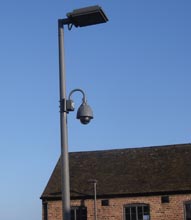The trade body the British Security Industry Association (BSIA) has responded to a recent front-page report in The Independent that councils in England and Wales are cutting back by spending less on public space CCTV. According to The Independent, “CCTV cameras in towns and cities across the country are being switched off by councils who cannot afford to keep them running, making it ‘increasingly difficult’ for police to investigate serious crimes…”
Indeed, in a speech to the CCTV User Group conference in Kenilworth, the Surveillance Camera Commissioner, Tony Porter QPM LLB spoke of seeing councils in large towns like Blackpool and Derby stop monitoring their systems 24/7. “My understanding is that this is not the result of a review or public consultation, but simply to save money.”
In response, Simon Adcock, Chairman of the BSIA’s CCTV Section and Managing Director of ATEC Security says: “I agree that councils should be reviewing their CCTV at scheme and camera level to ensure they are still meeting a need. If they are not then rationalising cameras is a sensible step and saving money is the natural consequence of having fewer cameras.”
“However, as Tony says, turning off cameras to save money without reference to whether they are useful is a different thing altogether and will compromise the Police’s ability to do their job, potentially endangering public safety in the long-term.”
According to Simon, privately funded CCTV can help in assisting the police, especially in instances where publically funded cameras fall short: “The private sector can provide valuable assistance by supplying CCTV footage to the police – supporting investigations and providing evidence as seen with high profile cases like that of James Bulger’s murder and the London bombings. In this way commercial businesses can be pivotal in steering police investigations towards convictions.”
Research by the BSIA in 2013 suggested that only one out of every 70 CCTV cameras in the UK is owned by public bodies, suggesting that both publicly and privately funded cameras have the potential to promote community safety. However, for the private sector to aid the police, effective communication is key, says Simon: “When utilised successfully, joined up communication between CCTV control room staff in the private sector and the police can present major benefits to the public – promoting safety on a day to day basis. What’s important for the public is that should they fall victim to opportunist criminals, those responsible are more likely to be convicted where CCTV is in use.”
While the private sector can assist by providing evidence, it does not render publically funded cameras unnecessary, as Simon says: “Whilst the Police often use private systems to obtain evidence, it is sometimes the publicly funded cameras that tell them where to look and who to approach for that evidence.”
Looking to the future, it is crucial that adequate standards are adopted across both the public and private sector in order to cement cross-communication benefits. The current CCTV Code of Practice – made up of 12 guiding principles – aims to define best practice in a way wherein public protection was paramount.
Simon says: “while the Code of Practice is undoubtedly a ‘step in the right direction’, its scope does not extend widely enough. Presently, the Code of Practice only extends to publicly-owned systems, meaning that the majority of CCTV cameras do not fall under the remit of the current standards dictated by government. Logically, the next step for the current CCTV Code of Practice is the application of its twelve guiding principles to cover privately-owned systems. Not only do they form the majority of CCTV coverage in the UK, they are also responsible for providing significant evidence to Police.”
Simon Adcock will be speaking about the Surveillance Camera Code of Practice on Wednesday, June 17, at IFSEC International alongside the BSIA Chairman, Pauline Norstrom. For more on BSIA activity at IFSEC: http://www.bsia.co.uk/Portals/4/documents/whats-on-ifsec-2015.pdf.
For more about the BSIA and its CCTV section, visit www.bsia.co.uk/cctv.









